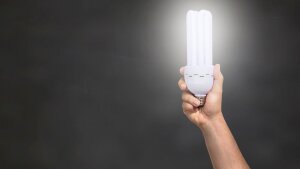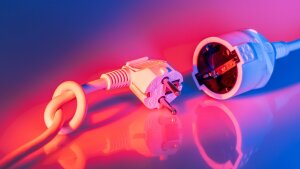
As a university community we can help to use resources efficiently and save energy by taking many small steps together. This way, we help to contain rising costs and protect the environment by conserving fossil fuels.
The sharp rise in prices on the energy market is a reaction to the bottleneck in gas supply. The gas emergency planExternal link declared by the German government highlights the tense situation.
In both the private and public sectors, we encourage all university members to respond collectively to this societal challenge and to use limited energy resources responsibly.
At home and at the university: significant rise in energy costs
A large proportion of gas consumption in Germany is used for heating. The enormous increase in gas prices poses major challenges for public institutions, companies and private households.
At the University of Jena about 4 % of energy consumption is covered by gas. However other energy sources such as district heating (approx. 48 %), electricity (approx. 47 %) and heating oil (approx. 1 %) are also affected by rising prices as a result of the gas shortage.
In 2021 the energy costs of the University of Jena amounted to approximately 8.5 million euros. These costs were covered by budgetary funds. Energy costs in 2022 increased by 3 million euros. Further cost increases are predicted for 2023.
The cost of electricity and gas has likewise increased in private households. The supply situation is expected to aggravate throughout the year.
Gemeinsam können wir unseren ökologischen Fußabdruck reduzieren
Image: PixabayTaking responsibility together with many small steps
Whether employee or student of the university, everyone can contribute and save energy with proactive and conscious behavior.
Together with over 22,000 university members we can safely overcome the energy crisis in many small steps and ensure warm temperatures in the lecture halls, offices, laboratories and libraries. At the same time we are protecting the climate and the environment by reducing harmful CO₂ emissions. You can find helpful tips on energy-saving measures at the university in our energy saving recommendationsExternal link!
Getting through the cold season at home
In order to get through this difficult time as comfortably and economically as possible you can find tips on how to save energy and costs in your private household below.
Optimized heating
The thermostat of a heater with different levels for regulating the room temperature.
Image: PixabayTypically the levels of the heating thermostat indicate a temperature setting. Each number represents a specific temperature level. The marks between each number represent a one-degree difference.
A common fallacy: turning the radiator higher does not mean that the room will warm up faster. The heater stops heating only at a higher temperature!
- When the room is being aired the thermostat should be turned to frost protection (level *).
- The temperature in rooms should not fall below 12 degrees even at night, otherwise mold can occur (level 1).
- For kitchens and bedrooms the German Environment Agency recommends a temperature of about 17 degrees (level 2).
- In offices the room temperature should be kept between 18 and 20 degrees (level 3). At the same time people have different comfort temperatures depending on their activity, health condition and gender.
- Level 4 (24°C) and level 5 (28°C) should only be selected in exceptional cases.
Your heating thermostat does not respond to temperature? Then it may be useful to purchase a new thermostat, which can save you energy and reduce costs. You can find recommendations for this at the ThermostatcheckExternal link of the German Environment Agency (available in German only).
A little dog is covered in a blanket.
Image: Matthew Henry- Warm clothing according to the multi-layer principle can compensate for lower room temperature if necessary.
- Efficient Airing: Regularly open the window completly for 3-5 minutes to provide yourself with fresh air and avoid mold.
- Avoid tilting the window: This causes the room to cool down without significant air exchange and increases the risk of mold formation.
- Keep radiators unobstructed: To allow warm air to circulate optimally radiators should not be covered or blocked by furniture.
- Close the doors between warm (study/ living room) and cool rooms (hallways, bedrooms, etc.).
- Regularly vent your radiators. If there is a gurgling sound in the radiator, air has probably accumulated. This eats up energy, as the remaining water now has to be heated to a higher temperature. Instructions on how to vent your own radiator can be found on the InternetExternal link.
Lighting according to your needs
Use electrical devices efficiently
An energy plug removed from the power socket reduces energy loss.
Image: Pixabay- Say bye-bye to the standby mode of TV sets, audio equipment, printer, amp, etc! Even switched-off devices such as washing machines or chargers continue to consume electricity when they are plugged in. Unplug them where possible or use power strips with on/off switches!
- Deactivate your WLAN router overnight or when you are not at home. If necessary, a timer can help.
- When buying new appliances look for the best efficiency class. The extra expense is often offset by lower electricity costs over the life cycle! The older the appliance the higher the power consumption. The more often the appliance is used the more it is worth buying a new one.
- Fully load washing machines/dishwashers and run them in eco mode.
You can find more useful tips on saving energy at home at
Saving Energie at home | Verbraucherzentrale Nordrhein-WestfahlenExternal link
You have additional information and would like to share your energy saving tips with us?
Send us your suggestions via email to nachhaltigkeit@uni-jena.de




